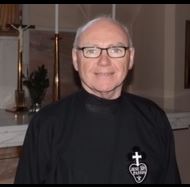As we enter into the Season of Lent, my thoughts turn towards the desert, seeing as how, on the first Sunday of every Lent, we witness Jesus going into the desert wilderness of Judea, where he is tempted by the devil and cared for by angels. I visited the Judean desert of Jesus’ temptations on my one and only pilgrimage to the Holy Land almost 30 years ago, but it has been the memory of two other desert experiences that have filled my mind in recent days.
The first desert experience was on a holiday to Tunisia, and this was about 20 years ago. Included in that holiday were trips to the markets at Tunis and the site of the ancient city of Carthage, where some of the early church councils took place that gave shape to what we call the Canon of Scripture, which in the Catholic Bible is now the 46 books of the Old Testament and the 27 books of the New Testament. There was also a mini-cruise to Egypt and back where we visited, amongst other attractions, the Pyramids of Giza, the Valley of the Kings, the Sphynx, and the Cairo Museum, including the golden tomb mask of Tutankhamun – all very wonderful. But, most memorably, there was a trip to the Saharan Desert, where we took a camel ride to the dunes of Douz at sunset, stopped awhile to admire the stunning views across the Sahara, and then took the camel ride back again by the light of the moon. However, the beauty of this trip was somewhat lost on me. I am not the tallest person on the planet, and, as Eric Morecambe used to say about Ernie Wise, I have short, fat, hairy legs; and yet, I seemed to have been given by far the largest camel in the herd – although I believe the collective noun for camels is a caravan. This beast was huge, and I had never sat on the back of a camel before. My legs were spread far wider than they had ever been in all my life, and the more we trekked out into the desert the greater the agony I felt. The sense of relief when we reached the halting place was immense, but I couldn’t enjoy the panoramic views across the desert because all I could think about was that I had to get back on this beast again. Further agony ensued by the light of the moon, and I have never felt so glad to fall into bed at the end of a day, vowing never to get on the back of a camel ever again, a vow I have resolutely kept, and I think it was about three days before I was able to walk normally again.
On the way back from Douz we visited the El Jem amphitheatre in Tunisia that had been used for the movie Gladiator, which had come out that same year, and I can tell you, I would rather face the lions in the amphitheatre before ever getting on the back of a camel again.
The second desert experience was 25 years ago when I visited our Passionist mission in South Africa and Botswana. During Lent 1995, I gave a retreat to the Passionists living and working there. It took place in our Novitiate at Forest Hill, just outside of the Botswana Capital, Gabarone. The retreat ended on the Friday of the 5th week of Lent, after which all the men returned to their missions to celebrate the Palm/Passion Sunday Liturgies. At that time Father Lawrence was living 400 kilometres out into the Kalahari Desert, and he asked me if I would like to come and celebrate the beginning of Holy Week with him. I readily accepted his invitation and, on the following day, I borrowed a pick-up truck, and began my long drive out to the mission. It was a fairly bleak drive, it didn’t have the same beauty as the Sahara, but at least the pick-up was more comfortable than the camel. When I arrived at the mission the locals were cutting palms from the trees for the procession next day, and decorating the rondavel church with cow dung in beautiful spirals. In bed that night, even though tired from the long drive, I was kept awake by a disco in a local hall that went on to all hours – yes, a disco, 400 kilometres out into the Kalahari! I couldn’t believe it. That was forgotten next day however, as the Palm/Passion Sunday celebration was so full of life and captured so well the joy of Christ’s entry into Jerusalem and the sorrow of his Passion, although at times I was a little distracted by lizards leaping about the floor and window ledges. Here is Hosea 2:14:
I will win her back once again. I will lead her into the desert, and speak tenderly to her there.

 RSS Feed
RSS Feed
